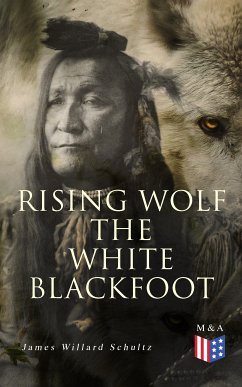
Rising Wolf the White Blackfoot (eBook, ePUB)
Versandkostenfrei!
Sofort per Download lieferbar
2,99 €
inkl. MwSt.
Weitere Ausgaben:

PAYBACK Punkte
1 °P sammeln!
In "Rising Wolf: The White Blackfoot," James Willard Schultz masterfully intertwines the perspectives of both the Indigenous peoples and European settlers in the American West, using vivid prose and rich imagery. The narrative centers on the life of a young boy of mixed heritage, who navigates the complexities of identity and belonging against the backdrop of rapid cultural transformation. Schultz's literary style is marked by its ethnographic detail and biographical elements, reflecting a deep engagement with both the landscape and the social dynamics of the Blackfoot Nation during the late 1...
In "Rising Wolf: The White Blackfoot," James Willard Schultz masterfully intertwines the perspectives of both the Indigenous peoples and European settlers in the American West, using vivid prose and rich imagery. The narrative centers on the life of a young boy of mixed heritage, who navigates the complexities of identity and belonging against the backdrop of rapid cultural transformation. Schultz's literary style is marked by its ethnographic detail and biographical elements, reflecting a deep engagement with both the landscape and the social dynamics of the Blackfoot Nation during the late 19th century, offering readers an intimate glimpse into a world undergoing profound change. James Willard Schultz, an American author and renowned explorer, lived among the Blackfoot people for several years, absorbing their customs and worldview. Schultz's experiences, coupled with his passion for storytelling, inspired him to document their rich culture and traditions through a lens of empathy and understanding. His personal connection to the community and dedication to preserving their history imbue the narrative with authenticity and respect, setting it apart from more conventional portrayals of Indigenous life. "Rising Wolf: The White Blackfoot" is an essential read for those interested in Indigenous literature, cultural studies, and American history. Schultz's compelling prose invites readers to engage with complex themes of identity, conflict, and resilience, making this work not only a significant historical account but also a touching exploration of the human spirit.
Dieser Download kann aus rechtlichen Gründen nur mit Rechnungsadresse in A, B, BG, CY, CZ, D, DK, EW, FIN, F, GR, HR, H, IRL, I, LT, L, LR, M, NL, PL, P, R, S, SLO, SK ausgeliefert werden.













